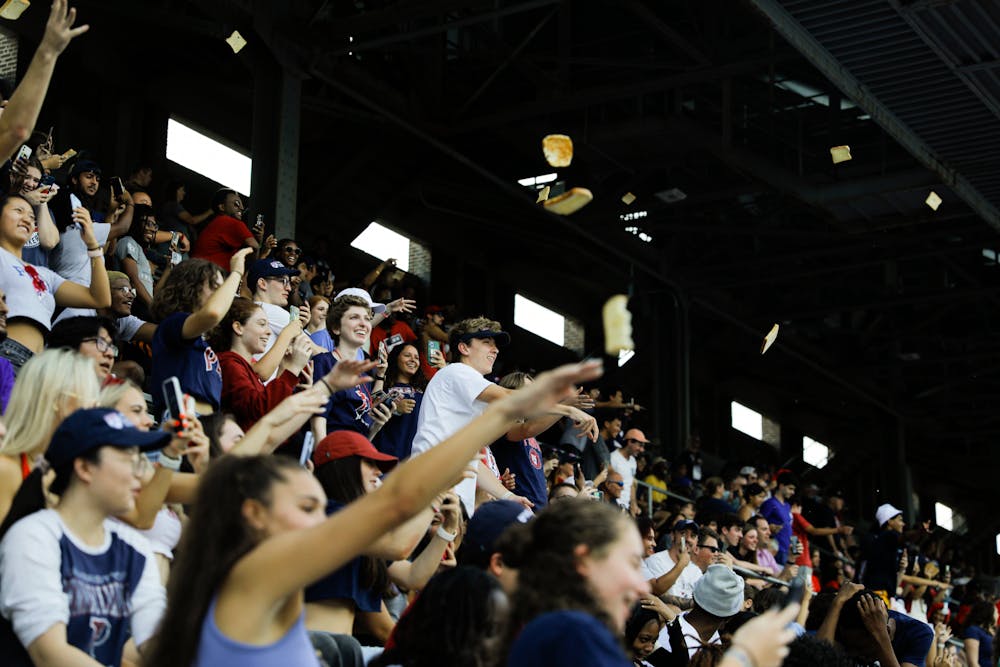My grandmother would be very disappointed in the University of Pennsylvania. Growing up in an Armenian household, it was made clear to me at a very young age that food should never be wasted; it is a privilege and blessing to have food on the table. If only she knew that her granddaughter's university uses a bread-Zamboni.
Penn’s toast-throwing tradition has been around since the 1970s, when alcohol was prohibited at Franklin Field. Since then, the students have honored the historic “Toast to Dear Old Penn” by throwing thousands of pieces of bread onto the field between the third and fourth quarters of football games, in place of “drinking a highball.”
This tradition, though meaningful and a gateway to the University’s past, is not sustainable in modern-day West Philadelphia. The Philadelphia area has dealt with food insecurity and poverty for years, and parts have ranked high among the hungriest areas in the United States. How, then, can the University continue this wasteful practice? Every game, thousands of slices of bread are tossed onto the field and into dumpsters with no further use. One might wonder if this act reflects the carelessness and negligence of some of the student body, or the administration’s indifference toward the problems facing the city.
Similar to other Ivy League institutions, Penn has a significant percentage of students from very wealthy backgrounds — people who won’t blink twice before watching all the toast go to waste. With so many people fitting into this box of privilege at Penn, it’s not surprising that this tradition has carried on for many years. Students arrive at games with their own pieces of bread, and sometimes even throw bakery items, like muffins and bagels. With no concern about waste, or the kind of guilt that pervades your mind when you’re a child of immigrants wasting a perfectly good item of food, Quakers toss away, knowing that a machine, followed by a maintenance crew, will pick up after them. But the problem isn’t the tradition of throwing bread; it’s the lack of initiative to find a practical solution for the aftermath.
I believe it is up to the student body — the influential, bright, and driven Quakers — to find a solution that allows us to keep up this tradition while being less wasteful.
In search of solutions that are up to date with sustainability protocols but still allow for the tradition to live on, I reached out to the Marketing Department at Penn Athletics. They explained that when ordering the bread for delivery, Penn Athletics asks for bread that is going stale or has reached the sell-by date. The department shared that “Penn is partnered up with the UPenn Chapter of Camp Kesem. Members of the club distribute the toast and collect donations for the organization.”
At the Family Weekend game against Harvard, I saw this effort myself. Members of the club were walking around with a poster advertising toast for $2 a slice. The club was using the toast tradition strategically, raising funds for a good cause. However, this effort only puts people’s dollars at a better use — not the toast itself.
Penn Athletics explained that after the toss, the toast is composted. However, first-hand experience at Saturday’s game would reveal otherwise. After the toast toss, I watched multiple Franklin Field employees pick up the tossed bread and throw thousands of wasted slices into regular trash cans, not the composting actions the Marketing Department had described.
SEE MORE FROM SOSE HOVANNISIAN:
I do believe that Penn Athletics has put in the thought to make this tradition more sustainable, especially after Penn was recently ranked No. 2 in World University Rankings for Sustainability. However, it is not clear how prudent the University is with keeping up with their waste mitigation strategies. At the end of the day, the efforts they’ve made and the steps toward sustainability I saw myself at the last game are not enough to justify the toast-toss tradition in the context of West Philadelphia. Many students still bring their own toast, bought most likely from nearby Acme, Giant, or Wawa, and they toss it away with no thought of its harm to the community.
Hopefully, Penn Athletics can strengthen its efforts when it comes to taking the Franklin Field toasts to a Philadelphia-based compost. Maybe they can create a rule that requires throwing the pieces of bread in sealed bags to keep them clean, so they can later be donated to a local food bank. Whatever the solution, there have to be more sustainable options out there. If people can engineer a turf cleaner into a Zamboni-type machine that picks up the bread, I’m sure they can also brainstorm strategies to solve the food waste problem.
At the end of the day, my Armenian grandmother probably wouldn’t find much use for a slice of Wonder Bread (and realistically would criticize it for being “too American” and, therefore, lacking flavor), but she wouldn’t be happy about any food going to waste. So next time you walk onto Franklin Field, ready to throw your bread and give a “toast to dear old Penn,” think of my grandmother, and all the better fates that piece of bread can have and how it can be used to feed someone in the Philadelphia area.
SOSE HOVANNISIAN is a College first year studying history from Los Angeles, Calif. Her email is sosehova@sas.upenn.edu.









